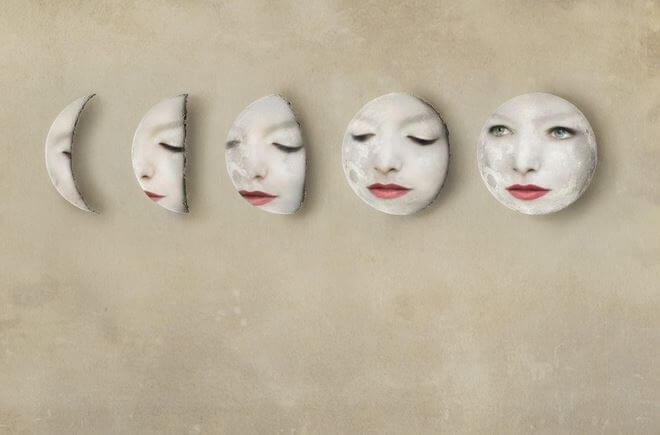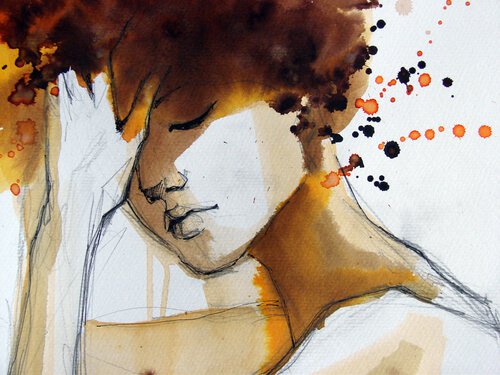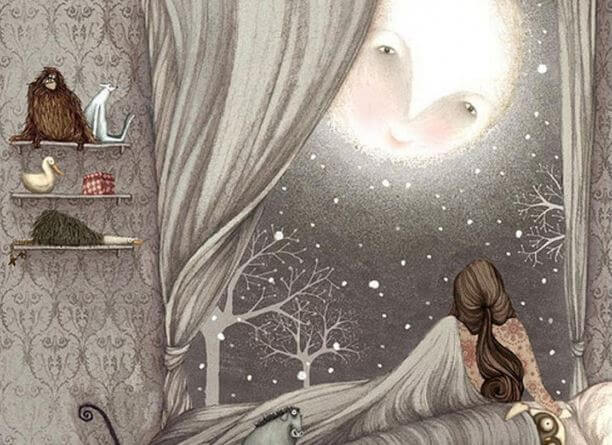How Does A Lack Of Sleep Affect Our Emotions?


Written and verified by the psychologist Raquel Aldana
A lack of sleep makes us look at life as if we were in some sort of video game. As a result we can develop the feeling that the world will melt with us inside it, while we stand paralyzed and unable to do anything to help.
Almost everyone, at some point, has been through phases where they haven’t gotten enough sleep. This may be because we have not devoted the necessary time to rest or because we have the feeling that we were not able to. Or maybe we suffer from restless sleep, or sleep that is of poor quality and does not leave us feeling rested when we wake up, despite having slept long enough.
As you’ll read ahead, what you’ve heard about having to sleep eight hours a day is very general and doesn’t work for everyone. In other words, everyone needs something different when it comes to sleep and rest. Let’s look a little further into this…

How to differentiate normal sleep variations from insomnia
It’s essential to know that the hours of sleep we each need may vary considerably from person to person. Maybe one person doesn’t need more than five hours of sleep daily, but others need up to ten to feel rested.
“Short sleepers” are usually concerned with the duration of their sleep. However, contrary to what happens to insomniacs, they don’t have difficulty falling or staying asleep. As a result, these people will not have daytime symptoms such as fatigue, concentration problems and irritability.
However, sometimes when “short sleepers” want to rest longer, they can stay in bed for hours and generate patterns similar to those of the person with insomnia. This, obviously, generates the feeling of lack of quality and quantity of sleep.
Similarly, as we we age the amount and quality of sleep changes, making it increasingly “less satisfactory.” Meanwhile, we can also find ourselves in difficult life situations that keep us from getting shut eye.
As you can see, all these situations are not problems in themselves, but they can be a prelude to the development of daytime symptoms that are distressing and unpleasant.
What happens when we don’t get enough rest?
As we mentioned, the complaint of lack of rest is so common that we have all gone through times when we felt exhausted, distressed and frustrated from not sleeping soundly.
So, knowing that our body uses sleep as a way to replenish and repair itself, we can imagine that the consequences of its deficiency are devastating. Let’s look at a few of them:
Irritability
This is one of the more noticeable symptoms in the beginning phases of sleep deprivation. When you do not have enough sleep felt so overwhelmed that everything seems maddening and intolerable.
So, we end up manifesting aggressive behavior all around us, including in ourselves. Much of what happens around us makes us angry and even the tiniest thing makes us snap. Worst of all, it’s something that we feel unable to control.
Fatigue and depression
A lack of regenerative sleep has negative consequences on our mood. Thus, fatigue and lack of mental rest, will succeed in making us feel deeply saddened and unable to carry out our tasks.
This causes us to lose the joy and zest for life, undermining our self esteem and our enthusiasm for new projects. Therefore, our attitude will be of surrender and diffidence.
In addition, the same fatigue may even provoke hallucinations and bizarre or strange perceptual experiences in every sensory modality (auditory, visual, physical, etc.)

Emotional instability
As we’ve mentioned, lack of rest makes it difficult for us to control our emotions, thoughts and behaviors. In this sense, emotional instability prevents us from coping with our emotions and, therefore, we feel like we’re on some kind of roller coaster.
Because of it, we may feel like crying just as soon as we felt like laughing, or simply want to hide from a world that we don’t want to be accountable for during an indefinite period of time.
Lack of alertness
Our attention and concentration decrease to their limits. When we’re tired, we’re not able to focus on anything or think clearly. This makes us feel deeply ashamed and unable to carry out tasks for our lack of lucidity.
“Brain fog” is a common expression for this inability to think in an orderly manner. This confusion is not a neurological problem, but rather is a feeling that will dim once we rest properly.
Inability to make decisions
As expected, the lack of focus prevents us from understanding the world around us. For this reason, it’s likely that if you haven’t slept well, your behaviors and thoughts will be much more erratic.

If sleep problems or poor sleep quality continue to persist, we may find ourselves with much more serious problems, such as major depressive disorder, hypertension and myocardial infarction, higher absenteeism, lower labor productivity, lower quality of life and economic difficulties.
Learn how to optimize your sleeping arrangements
Being aware of our body and mind’s needs is essential to providing ourselves good rest. Therefore, our task is to examine our habits when we go to bed and how they affect our rest, positively and negatively.
So, in order to optimize our sleep, we need to maintain certain routines in a stable fashion. Let’s review some of the advice we are given by psychologists:
- Don’t consume caffeine for at least six hours before bed.
- Don’t smoke or drink alcohol at least 2-3 hours before going to bed.
- Don’t exercise strenuously before going to sleep.
- Don’t eat large amounts of food and/or liquids before bedtime.
- Do not eat if you wake up during the night.
- Maintain a comfortable room temperature (no more than 23°) and reduce the brightness and noise in the room where you go to sleep.
- Do not go to bed hungry.
- Avoid sleeping on a hard mattress.
- Reduce naps.
- Remove the alarm in your room to reduce anxiety.
- Only go to bed for the night when sleepy.
- If you are still unable to get to sleep after 20 minutes, it’s best to get up and do a calm activity until you feel sleepy.
- Keep a regular schedule and only go to bed for sleep or sex.
If despite changing all of these variables to control it your trouble sleeping persists, you must see a specialist to help you solve the problem. Give yourself the break you deserve.
Images by Salvador Dalí, Valentina Photos, Bruneiwska and natalia_maroz
A lack of sleep makes us look at life as if we were in some sort of video game. As a result we can develop the feeling that the world will melt with us inside it, while we stand paralyzed and unable to do anything to help.
Almost everyone, at some point, has been through phases where they haven’t gotten enough sleep. This may be because we have not devoted the necessary time to rest or because we have the feeling that we were not able to. Or maybe we suffer from restless sleep, or sleep that is of poor quality and does not leave us feeling rested when we wake up, despite having slept long enough.
As you’ll read ahead, what you’ve heard about having to sleep eight hours a day is very general and doesn’t work for everyone. In other words, everyone needs something different when it comes to sleep and rest. Let’s look a little further into this…

How to differentiate normal sleep variations from insomnia
It’s essential to know that the hours of sleep we each need may vary considerably from person to person. Maybe one person doesn’t need more than five hours of sleep daily, but others need up to ten to feel rested.
“Short sleepers” are usually concerned with the duration of their sleep. However, contrary to what happens to insomniacs, they don’t have difficulty falling or staying asleep. As a result, these people will not have daytime symptoms such as fatigue, concentration problems and irritability.
However, sometimes when “short sleepers” want to rest longer, they can stay in bed for hours and generate patterns similar to those of the person with insomnia. This, obviously, generates the feeling of lack of quality and quantity of sleep.
Similarly, as we we age the amount and quality of sleep changes, making it increasingly “less satisfactory.” Meanwhile, we can also find ourselves in difficult life situations that keep us from getting shut eye.
As you can see, all these situations are not problems in themselves, but they can be a prelude to the development of daytime symptoms that are distressing and unpleasant.
What happens when we don’t get enough rest?
As we mentioned, the complaint of lack of rest is so common that we have all gone through times when we felt exhausted, distressed and frustrated from not sleeping soundly.
So, knowing that our body uses sleep as a way to replenish and repair itself, we can imagine that the consequences of its deficiency are devastating. Let’s look at a few of them:
Irritability
This is one of the more noticeable symptoms in the beginning phases of sleep deprivation. When you do not have enough sleep felt so overwhelmed that everything seems maddening and intolerable.
So, we end up manifesting aggressive behavior all around us, including in ourselves. Much of what happens around us makes us angry and even the tiniest thing makes us snap. Worst of all, it’s something that we feel unable to control.
Fatigue and depression
A lack of regenerative sleep has negative consequences on our mood. Thus, fatigue and lack of mental rest, will succeed in making us feel deeply saddened and unable to carry out our tasks.
This causes us to lose the joy and zest for life, undermining our self esteem and our enthusiasm for new projects. Therefore, our attitude will be of surrender and diffidence.
In addition, the same fatigue may even provoke hallucinations and bizarre or strange perceptual experiences in every sensory modality (auditory, visual, physical, etc.)

Emotional instability
As we’ve mentioned, lack of rest makes it difficult for us to control our emotions, thoughts and behaviors. In this sense, emotional instability prevents us from coping with our emotions and, therefore, we feel like we’re on some kind of roller coaster.
Because of it, we may feel like crying just as soon as we felt like laughing, or simply want to hide from a world that we don’t want to be accountable for during an indefinite period of time.
Lack of alertness
Our attention and concentration decrease to their limits. When we’re tired, we’re not able to focus on anything or think clearly. This makes us feel deeply ashamed and unable to carry out tasks for our lack of lucidity.
“Brain fog” is a common expression for this inability to think in an orderly manner. This confusion is not a neurological problem, but rather is a feeling that will dim once we rest properly.
Inability to make decisions
As expected, the lack of focus prevents us from understanding the world around us. For this reason, it’s likely that if you haven’t slept well, your behaviors and thoughts will be much more erratic.

If sleep problems or poor sleep quality continue to persist, we may find ourselves with much more serious problems, such as major depressive disorder, hypertension and myocardial infarction, higher absenteeism, lower labor productivity, lower quality of life and economic difficulties.
Learn how to optimize your sleeping arrangements
Being aware of our body and mind’s needs is essential to providing ourselves good rest. Therefore, our task is to examine our habits when we go to bed and how they affect our rest, positively and negatively.
So, in order to optimize our sleep, we need to maintain certain routines in a stable fashion. Let’s review some of the advice we are given by psychologists:
- Don’t consume caffeine for at least six hours before bed.
- Don’t smoke or drink alcohol at least 2-3 hours before going to bed.
- Don’t exercise strenuously before going to sleep.
- Don’t eat large amounts of food and/or liquids before bedtime.
- Do not eat if you wake up during the night.
- Maintain a comfortable room temperature (no more than 23°) and reduce the brightness and noise in the room where you go to sleep.
- Do not go to bed hungry.
- Avoid sleeping on a hard mattress.
- Reduce naps.
- Remove the alarm in your room to reduce anxiety.
- Only go to bed for the night when sleepy.
- If you are still unable to get to sleep after 20 minutes, it’s best to get up and do a calm activity until you feel sleepy.
- Keep a regular schedule and only go to bed for sleep or sex.
If despite changing all of these variables to control it your trouble sleeping persists, you must see a specialist to help you solve the problem. Give yourself the break you deserve.
Images by Salvador Dalí, Valentina Photos, Bruneiwska and natalia_maroz
This text is provided for informational purposes only and does not replace consultation with a professional. If in doubt, consult your specialist.







